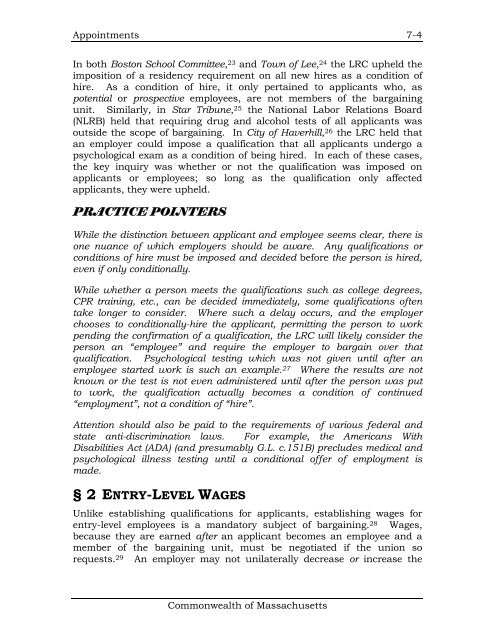Management Rights - AELE's Home Page
Management Rights - AELE's Home Page
Management Rights - AELE's Home Page
You also want an ePaper? Increase the reach of your titles
YUMPU automatically turns print PDFs into web optimized ePapers that Google loves.
Appointments 7-4<br />
In both Boston School Committee, 23 and Town of Lee, 24 the LRC upheld the<br />
imposition of a residency requirement on all new hires as a condition of<br />
hire. As a condition of hire, it only pertained to applicants who, as<br />
potential or prospective employees, are not members of the bargaining<br />
unit. Similarly, in Star Tribune, 25 the National Labor Relations Board<br />
(NLRB) held that requiring drug and alcohol tests of all applicants was<br />
outside the scope of bargaining. In City of Haverhill, 26 the LRC held that<br />
an employer could impose a qualification that all applicants undergo a<br />
psychological exam as a condition of being hired. In each of these cases,<br />
the key inquiry was whether or not the qualification was imposed on<br />
applicants or employees; so long as the qualification only affected<br />
applicants, they were upheld.<br />
PRACTICE POINTERS<br />
While the distinction between applicant and employee seems clear, there is<br />
one nuance of which employers should be aware. Any qualifications or<br />
conditions of hire must be imposed and decided before the person is hired,<br />
even if only conditionally.<br />
While whether a person meets the qualifications such as college degrees,<br />
CPR training, etc., can be decided immediately, some qualifications often<br />
take longer to consider. Where such a delay occurs, and the employer<br />
chooses to conditionally-hire the applicant, permitting the person to work<br />
pending the confirmation of a qualification, the LRC will likely consider the<br />
person an “employee” and require the employer to bargain over that<br />
qualification. Psychological testing which was not given until after an<br />
employee started work is such an example. 27 Where the results are not<br />
known or the test is not even administered until after the person was put<br />
to work, the qualification actually becomes a condition of continued<br />
“employment”, not a condition of “hire”.<br />
Attention should also be paid to the requirements of various federal and<br />
state anti-discrimination laws. For example, the Americans With<br />
Disabilities Act (ADA) (and presumably G.L. c.151B) precludes medical and<br />
psychological illness testing until a conditional offer of employment is<br />
made.<br />
§ 2 ENTRY-LEVEL WAGES<br />
Unlike establishing qualifications for applicants, establishing wages for<br />
entry-level employees is a mandatory subject of bargaining. 28 Wages,<br />
because they are earned after an applicant becomes an employee and a<br />
member of the bargaining unit, must be negotiated if the union so<br />
requests. 29 An employer may not unilaterally decrease or increase the<br />
Commonwealth of Massachusetts
















